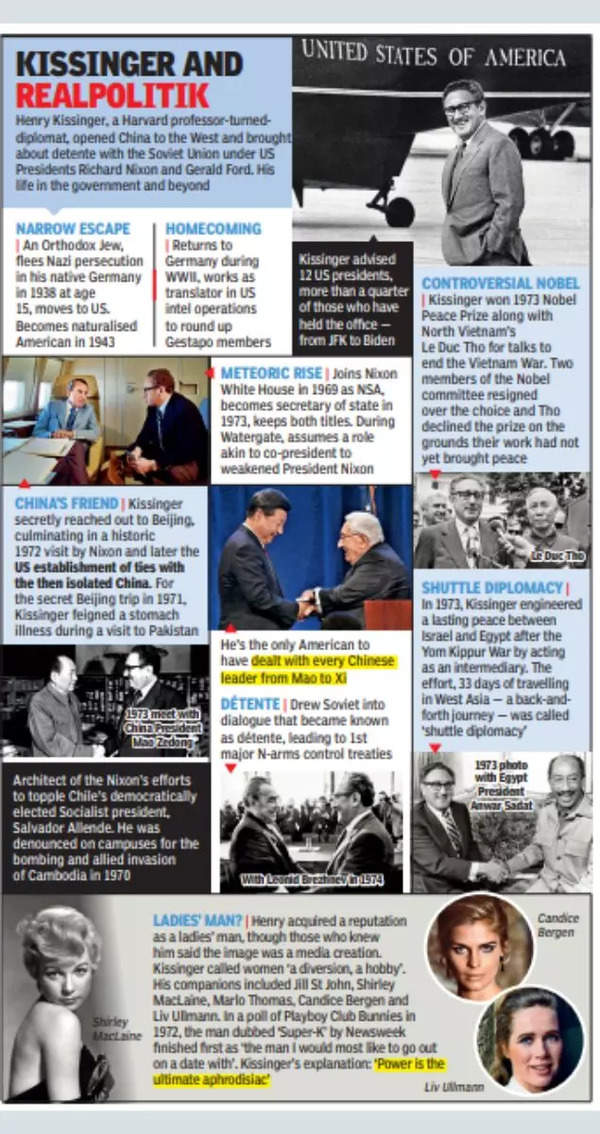[ad_1]
Kissinger, a German-born Jewish refugee whose career took him from academia to diplomacy and who remained an active voice in foreign policy into his later years, died at his Connecticut home Wednesday, his geopolitical consulting firm, Kissinger Associates, said.
Kissinger was at the height of his powers during the 1970s in the middle of the Cold War when he served as national security adviser and secretary of state under Republican President Richard Nixon. After Nixon’s resignation in 1974 amid the Watergate scandal, he remained a diplomatic force as secretary of state under Nixon’s successor, President Gerald Ford.
Kissinger was the architect of the US diplomatic opening with China, landmark US-Soviet arms control talks, expanded ties between Israel and its Arab neighbours, and the Paris Peace Accords with North Vietnam. While many hailed Kissinger for his brilliance and statesmanship, others branded him a war criminal for his support for anti-communist dictatorships, especially in Latin America. He won the 1973 Noble Peace Prize for ending US involvement in the Vietnam War. Two Nobel committee members quit over the selection as questions arose about the secret US bombing of Cambodia. Co-winner North Vietnamese diplomat Le Duc Tho declined it.

As tributes poured in from around the world, Beijing called him a “good old friend of the Chinese people” who made historic contributions to normalizing relations between the two countries. Russian President Putin praised Kissinger as a “wise and farsighted statesman” while Israeli PM Netanyahu said his meetings with Kissinger provided “a master class in statesmanship”.
Bangladeshi foreign minister Abdul Momen, however, recalled Kissinger’s role in the bloody 1971 war between West and East Pakistan that led eventually to East Pakistan becoming an independent Bangladesh, saying: “In 1971, he was dead against the people of the then-East Pakistan. … That is very sad for such a smart man to do such inhumane things. … He should have apologized to the people of Bangladesh for what he has done.”
As secretary of state, Kissinger went with Ford in 1974 to Vladivostok in the Soviet Union, where the president met Soviet leader Leonid Brezhnev and agreed to a basic framework for a strategic arms pact. The agreement capped Kissinger’s pioneering efforts at detente that led to an easing of US-Soviet tensions. But Kissinger’s diplomatic skills had their limits. In 1975, he was blamed for failing to persuade Israel and Egypt to agree to a second-stage disengagement in the Sinai. And in the India-Pakistan War of 1971, Nixon and Kissinger drew heavy criticism for tilting toward Pakistan. Like Nixon, he feared the spread of left-wing ideas in the Western Hemisphere, and his actions in response led to deep distrust of Washington by many Latin Americans for years to come. In 1970, he plotted with the CIA on how best to topple the Marxist, democratically elected Chilean President Salvador Allende, and in a memo after Argentina’s coup in 1976 he said that the military dictators should be encouraged.
Kissinger remained active late in life, attending meetings in the White House, publishing a book on leadership, and testifying before a Senate committee about North Korea’s nuclear threat. In July 2023, Kissinger, at the age of 100, made a surprise visit to Beijing to meet President Xi Jinping.
[ad_2]
Source link

